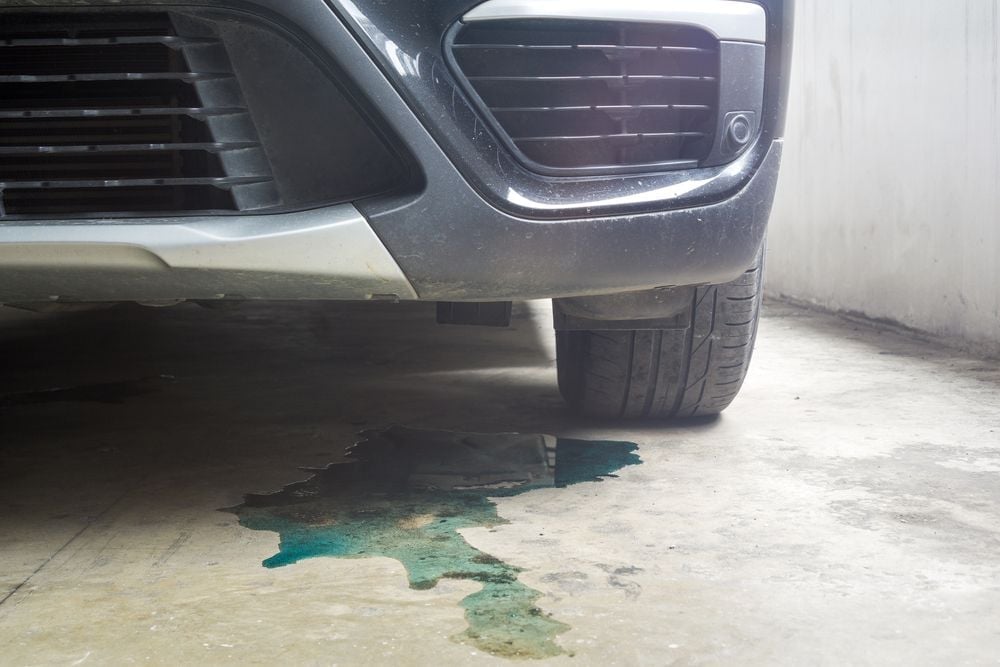
Coolant is a liquid that helps remove heat from your engine by circulating through the system and absorbing heat. The coolant then carries this heat to the radiator, where it is released, and then the coolant circulates through the engine again.
If your car starts to leak coolant, the engine can overheat and damage sensors, gaskets, and other parts.
A coolant leak that only occurs while your vehicle is running usually comes from a faulty radiator cap, leaky hose, or faulty water pump. The coolant will heat and expand as your engine runs, creating pressure that exacerbates any small leaks that you may not usually notice.
If you've never had to deal with a coolant leak, don't worry.
Instead, keep reading to learn everything you need to know about the coolant system and discover what you can do to fix the problem.
 Coolant leak underneath a car
Coolant leak underneath a car
Car Coolant System Explained
Your car's cooling system is made up of several different parts that work together to remove heat from the engine.
The system includes the radiator, hoses, water pump, and thermostat.
The radiator is the main component of the cooling system and is responsible for releasing heat from the coolant.
The water pump circulates the coolant through the system, and the thermostat regulates the temperature of the coolant.
The hoses connect the different parts of the system and allow the coolant to flow through.
The coolant itself is a mixture of water and antifreeze. The water helps absorb the heat, and the antifreeze prevents the water from freezing.
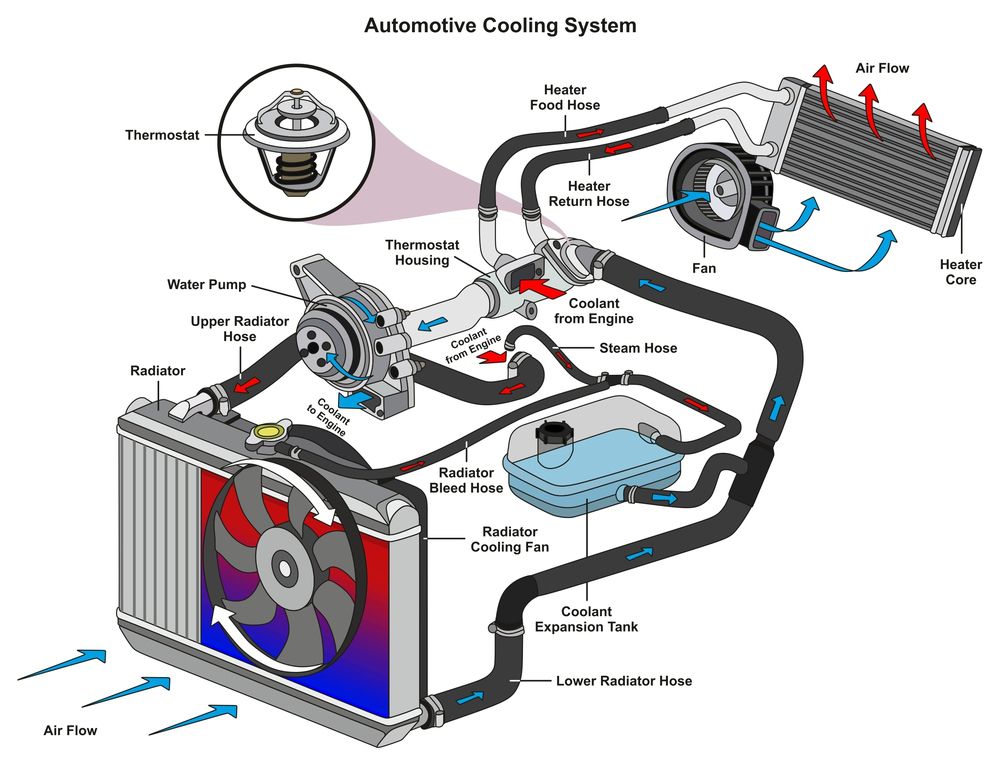 Car cooling system overview
Car cooling system overview
The mixture also contains rust inhibitors and other chemicals that help keep the system clean and running smoothly.
However, over time, the coolant can become contaminated and must be flushed from the system. This is typically done every 30,000 miles or so.
Most Common Causes Of A Coolant Leak While Running?
Since the coolant system is comprised of many different parts, there are plenty of reasons why your car might be leaking coolant. Anything from a faulty hose to a blown head gasket could be causing the problem.
Keep reading below to figure out what might be causing the problem, and take your vehicle to a mechanic as soon as possible to get it fixed.
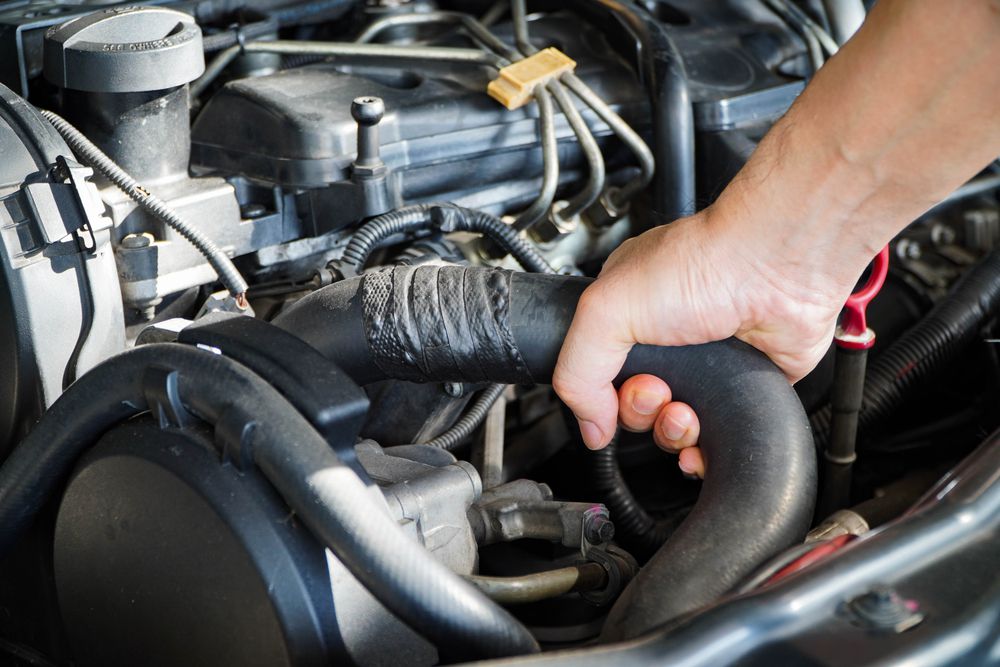 Technician inspecting coolant hose
Technician inspecting coolant hose
Cracked Or Loose Rubber Coolant Hose
One of the most common reasons for a coolant leak is a cracked or loose rubber coolant hose.
These hoses are responsible for carrying the coolant to and from the radiator and engine.
Over time, they can become brittle and crack, which will cause a leak.
If you suspect that a coolant hose is a problem, check the hoses for cracks or leaks. If you find a leak, replace the hose as soon as possible.
Leaking Radiator
Another common reason your vehicle might be leaking coolant is if there's a crack in the radiator.
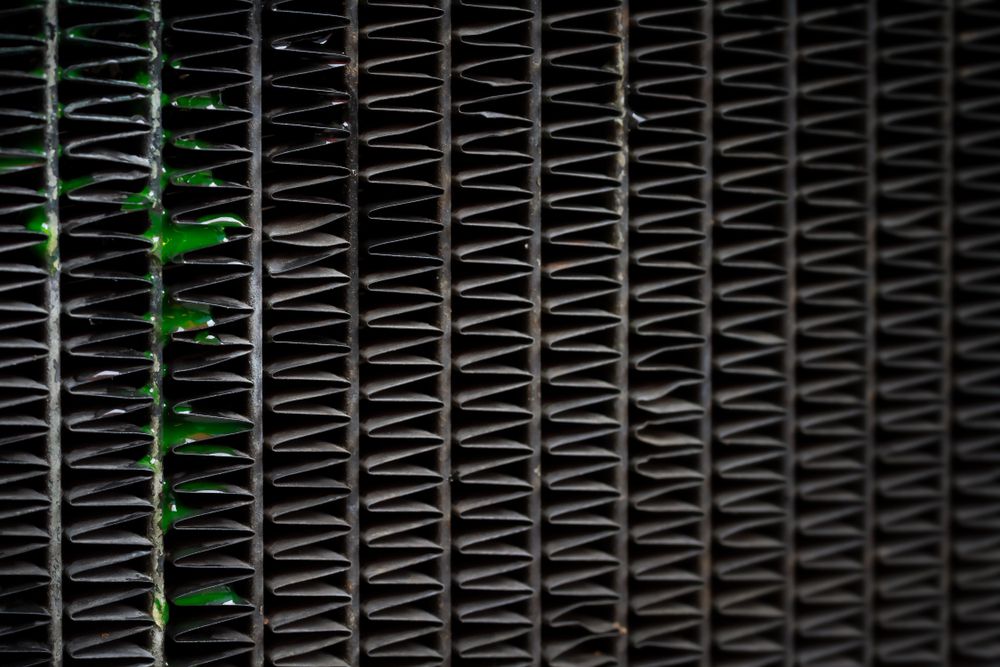 Green coolant leaking out of a radiator
Green coolant leaking out of a radiator
As the coolant passes through the system, it's supposed to cool off in the radiator, but if the radiator has been damaged, it will leak from the engine.
You'll immediately recognize the problem by the green or red residue caked around your car's radiator.
Take it to a mechanic and have them replace the part.
Faulty Radiator Cap
The radiator cap is responsible for keeping the coolant in the system and preventing it from leaking.
However, the cap can become worn over time and might not fit as snugly as it should.
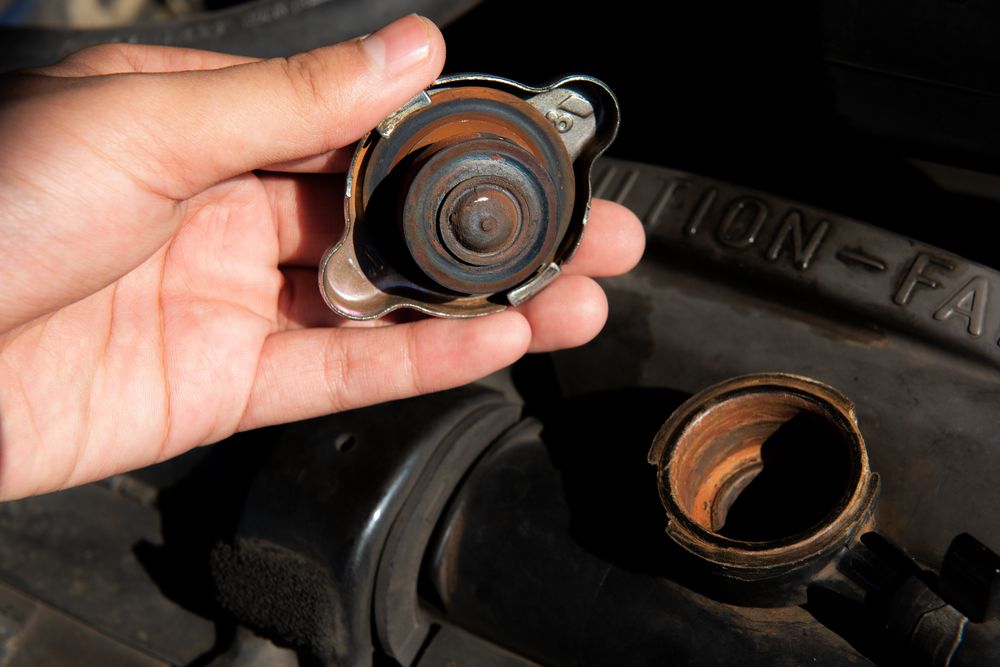 Old radiator cap
Old radiator cap
The cap will leak each time the engine heats up, and the coolant expands if the cap is loose.
This is an easy problem to fix and only requires that you replace the radiator cap with a new one.
Will Water Pump Leak When Engine Is Running?
Since the water pump is responsible for circulating coolant throughout the engine, if the pump is damaged, it can cause a leak. A faulty seal or gasket typically causes this.
If you think the water pump might be the problem, take your car to a mechanic and have them take a look.
They will likely need to replace the pump, a fairly extensive repair.
Blown Head Gasket
One of the most serious problems that can cause a coolant leak is a blown head gasket. The head gasket is the seal between the engine and the cylinder head.
Coolant and oil can mix if the head gasket is blown, leading to further engine damage.
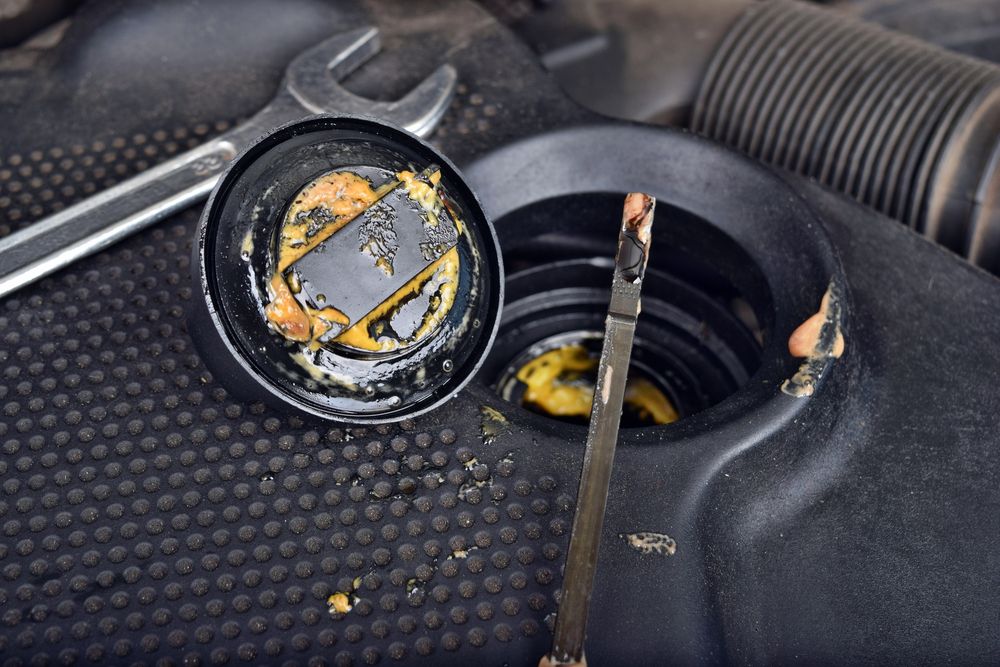 Foamy oil on oil cap indicating a blown head gasket
Foamy oil on oil cap indicating a blown head gasket
A blown head gasket is very serious and will require a mechanic's help to replace it. Fair warning, though, it's a time-consuming and expensive process.
Finding Coolant Leaks
Since coolant can leak from a range of parts, you'll have to be patient and pay close attention to different areas of your vehicle.
Once you have a general idea of where the coolant is leaking, you can narrow it down to just a few culprit parts.
Coolant Leaking from the Bottom of the Car?
If you notice that the coolant is leaking from the bottom of your car, it's likely coming from the radiator or a hose.
Check the hoses for any cracks or leaks, and replace the hose if you find one.
If the radiator is the problem, take it to a mechanic to have it replaced.
Coolant Leaking from the Passenger's Side?
If the coolant is leaking from the passenger's side, it might be coming from the water pump or thermostat.
These parts are located on the side of the engine, so it's easy to tell if they're the problem.
If you think either part is to blame, take your car to a mechanic and have them check it out.
Coolant Leaking from the Middle of the Car?
If coolant is leaking from the middle of the car, it's most likely a problem with the hoses or heater core.
The radiator and thermostat are located towards the front of the vehicle and, therefore, cannot be to blame.
Check the hoses for any cracks or physical damage and replace any faulty parts.
Coolant Leaking After the Car Cools Down?
If you only notice the coolant leak after the car has cooled down, it was most likely leaking while the car was running, and you didn't see it.
The coolant will have contracted once the engine has cooled, and leaks might reduce.
Car Leaks Fluid Only When Running?
If your car only leaks fluid when it's running, the leak is happening while the coolant is hot and under pressure.
This is most likely due to a faulty water pump forcing coolant out with every pump.
When the car stops running, it no longer pumps coolant and, therefore, you don't notice the problem.
However, check the part for any damage and, if necessary, take your vehicle to a mechanic to have the pump replaced.
Coolant Leaking After Sitting Overnight?
If your vehicle is leaking coolant after sitting out all night, it's probably due to a crack in a hose or a loose clamp.
When the coolant is hot, it's under enough pressure that it can squeeze by a loose clamp without leaking.
However, it will slowly leak from the bad connection when left to sit overnight.
Check the clamps and hoses and make any adjustments if needed.
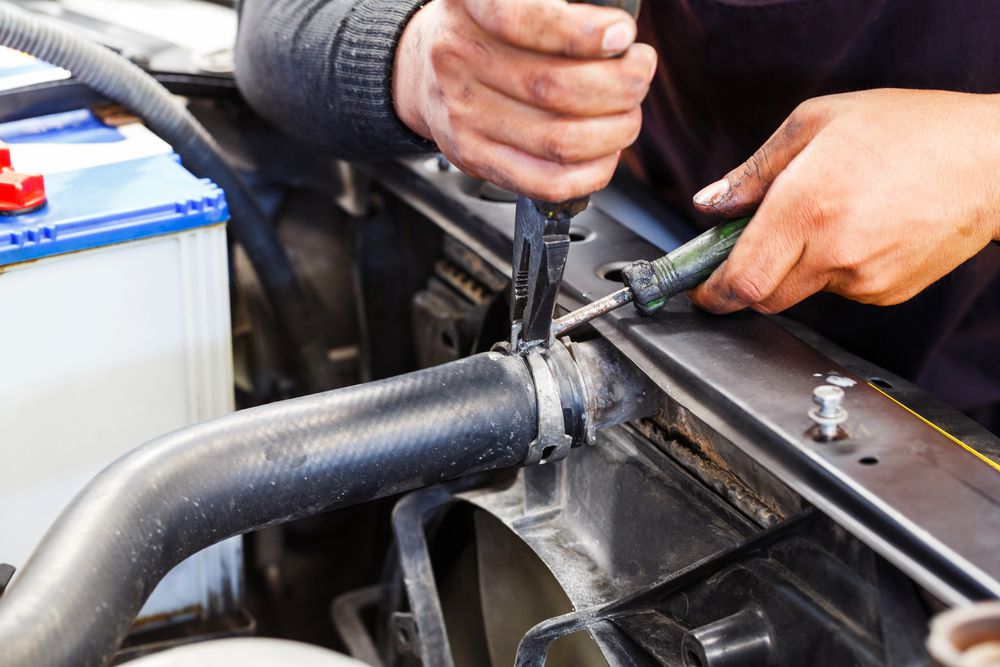 Tightening radiator hose clamps
Tightening radiator hose clamps
Why Is My Car Leaking Antifreeze But Not Overheating?
If your car is leaking antifreeze but not overheating, it's likely because the leak is small or the coolant system is full.
The radiator is responsible for holding most of the coolant, so if there's a small leak, it might not be noticeable.
It's also possible that the system is so full that the coolant is spilling out rather than leaking.
Either way, it's best to take your car to a mechanic and have them check for any leaks.
If you live far away from a mechanic and are worried about your vehicle overheating during the trip, top up the radiator with extra coolant before you head out to keep the system flowing.
Can I Drive My Car With A Coolant Leak?
Technically, you can drive your car with a coolant leak, but it's not advisable to go too far.
If the leak is bad enough, your car can overheat and cause damage to the sensors, gaskets, cylinders, and other essential parts of your engine.
It's best to have the problem fixed as soon as possible to avoid any further damage.
If you have to drive your car with a coolant leak, keep an eye on the temperature gauge and pull over if it starts to get too hot.
Also, consider bringing along extra coolant and water so that you can top up the radiator as needed.
The last thing you want is to blow out your engine on the way to the mechanic simply because you forgot to bring extra coolant.
You can add coolant while the engine is running, but make sure you add the coolant to the reservoir and not the radiator.
Coolant Leak Repair Cost
The cost of repairing a coolant leak will depend on the severity of the problem and the parts that need to be replaced.
A simple hose replacement might cost a few hundred dollars, while a blown head gasket and a damaged radiator could cost upwards of several thousand dollars.
It's best to take your car to a mechanic and have them diagnose the problem. They will be able to give you a more accurate estimate of the repair costs and set a timetable for how soon you'll have your vehicle back.
Conclusion
A coolant leak can be a serious problem and, if left unchecked, can cause widespread damage to your engine.
It's important to be vigilant and check your car regularly for any leaks.
If you notice a problem, take your vehicle to a mechanic as soon as possible to have it fixed.